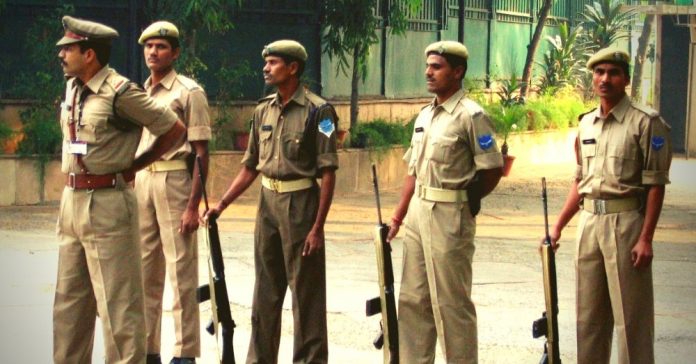The article is written by Stuti Jain, from Vivekananda institute of professional studies. This article explains the concept of community policing and how there are some myths attached to it.
Table of Contents
Introduction
Community policing increases police functions if compared to traditional policing. Community policing is when police work closely with the community members to reduce crime and fear among the people and maintain harmony and order within society as a whole. It gives more discretionary power to the lower-ranked officers since community policing is a decentralized control of policing. It focuses on more interactive and communicative relationships between the police and the society members. One of the main characteristics is that the police officer located in a particular region knows the residents within his/her locality so that he/she can take appropriate measures to prevent the crime with his efforts and resources along with that of the community. The decision making is more spontaneous in this method of policing. Officials educate people around them, about “when to get suspicious that some crime is being committed near you” or “how to respond to any particular activity” etc.
Why is community-police a policing strategy in the 21st century
With the change of time, it has become important that the way our police system works also gets modified. With an increased number of illegal drugs, gang fights, robbery, road rage cases, rape cases especially in India, the police system must be comparatively more decentralized. With a large number of underage teenage drinking and an increased number of violent areas, the traditional way of policing can’t suffice.
Also, the family structure in India within 10-15 years has changed drastically. The joint family structures have worn down to nuclear family structures. Due to which the parent and family often indulge in leaving their child alone at homes, hence making them more vulnerable to be a crime victim.
India being a diverse country, with so many religions and so many racial groups, the interests of each group differ, which increases the chance of disputes within a society.
These are the new kinds of problems that have emerged in the 21st century and hence need more responsive actions to be taken. It’s high time now, that the Indian government and police understand the root causes of crime. Instead of responding to the crime once it’s done, it’s better to reach the crime scene and prevent the same.
We live in a society where our legal system focuses on more reformative theory rather than deterrence, hence according to Ms Kiran Bedi, “The beat officers should also ensure that past criminals living in their areas live a reformed life by being involved in productive employment or live peacefully,”
How does community policing prove to be beneficial
Community policing helps the community in the following manner:
- It fosters trust between the police and the community. Community starts seeing the police as their protector and not as a warrior against them, hence building more positive relations.
- Since different communities have different upbringings, different cultures and needs, each of them need a different form of approach for law enforcement. Community policing helps the officials understand the particular need of each such community.
- Community policing helps the officials understand the particular need of each such community.
- Since the police are stationed at almost every local community, making a deterrence amongst the offenders.
- Police can’t reduce the crime on its own wholly, hence through the participation of members of the community, and with the concept of giving and taking we can improve the society as a whole.
- It helps people to voice their problems related to the crime to the officials directly, hence improving the quality of living in a safe neighbourhood.
- As stated above, decision making is much more spontaneous in community policing, since the police station in a particular area, has his powers and authority.
Impact of the absence of community policing
- In the absence of community policing, the small burglars get more monopoly and freedom to out-turn their malice intentions. These burglars generally do their research well, as to where the police station is situated, and in what areas the police generally focus more. Hence, the burglars commit crimes in the small streets where police generally don’t focus. However, due to community policing, when police roam around on their bikes/ foot patrolling, these burglars become more precautious about the consequences.
- This crime may sound quite petty, but it has some serious consequences on the mental health of the victim. Chain snatching or purse snatching is a very common crime committed in India, a traditional form of police patrolling could never solve this problem.
- Road rage being a serious problem all across India, especially in Delhi and UP; in absence of police patrolling the statistics could go much higher.
- In the absence of community policing, people might not get educated as to how to respond to a particular crime that’s committed. People would lack the basic education of self-defence. Community members will not act if they are afraid or suspicious.
Reality and myth associated with community policing
Police don’t prevent crime, they just respond to it
It might seem to us that community policing hasn’t helped us in any way till now, because till now no burglar has ever tried to trespass my house or my neighbour’s house ever, and have never been caught by the police around me. But what we see is the final results of what happens near us, we don’t see what might be the impact of these police officers doing their petty jobs like catching some suspicious drunk/ drugged man walking on the road, or when they catch hold of a person driving on the roads while drinking or not letting any person in your locality at midnight. These petty actions, if not done, might have serious consequences at the end, like robbery or murders or accidents. So we should think before we start judging that a police officer or even our watchman doesn’t do their jobs effectively.
Community policing is a one-sided job and just a matter of social work
Community policing, rather than social work is a matter of partnership between community and police. Police don’t single-handedly provide protection and their services to people. Rather, community members and police together keep the environment and society safe. Both use their resources and efforts to reach a common goal. Social work, on the other hand, is more of the job of the one providing you with the help, than the one receiving it.
Community policing is just wholly decentralized with no one controlling the police at the field
It’s a total misperception that the police on the field aren’t under the control of anyone. Rather they’re the extended nodes to a centralized system itself. They’re accountable for their actions. Just like the traditional policing does exist within this system of community policing. The police at the field’s main job is to interact with people and convey their problems to seniors so that appropriate actions could be taken. Also, to find the basic root of the recurring crime in their area, a special investigation needs to be done by traditional methods of policing.
Community policing is a secondary job, the main job is done by police at the station
No! In Fact, the police that is stationed in the field have much more hard work and mind work to do than that of police at the station. If the ground level police wouldn’t convey the upcoming new type of crimes to the senior officials, their work would completely become meaningless. Community policing isn’t a secondary job, but an extension to the primary job itself.
Community policing is costly, and it’s not worth the cost
Community policing no doubt does require a much larger number of police officials than traditional policing, but it doesn’t always mean that it would increase the cost of internal affairs. The research cost that the department used to occur to solve crimes and the main issue of the crimes, must have been reduced to this. The community policing helps the department find the root cause of the crime occurring. Moreover, nowadays, the criminals are coming up with newer and technical ways of the crime, which could only and only be understood by not just sitting at police stations but by interacting with the community at ground level. Also, it makes sure people are well aware of the newer kind of crimes, and make sure they’re immune from it.
Issues and challenges
- Lack of police officials: One of the major challenges regarding the implementation of community police is the lack of resources. Most of the times, the department don’t have enough police officers to post them in all the decided localities.
- Lack of equipment and funding: The non- availability of wireless communication devices increased by 231% from 2012 to 2016. At the beginning of 2017, almost 273 police stations lacked vehicles. Not only this, but transport resources were also just 8, for every 100 police officials. As per the report by the comptroller auditor general, a deficit of 32% for trained manpower for operating the equipment was present. Many police are unprepared to face or use lethal force due to poor equipment and lack of weapons training even if they’re present at a crime scene. A large amount of funding is also needed initially to educate and train the communication, interactive skills amongst the officers. Also, if officers indulge in overtime, or if any injury is caused on duty, they need to be paid for it. Most of our police officers are trained for the old and traditional ways of patrolling, they aren’t very compatible with the newer forms of security needed.
- Lack of motivation and rewards: Most of the time, the lower-ranked officers engage in overtime and are often exhausted. Often, even after the hard work, they aren’t able to resort to promotions due to internal politics or other reasons, due to which they engage themselves in violent behaviour towards the community and aren’t generally able to give what they are supposed to give. These minute reasons disturb the whole concept of community policing because even communities start disrespecting and treating these officials with bad behaviour. Due to which, when even a fresher police official comes in with great enthusiasm, it all dies within a few months of their duty on fields.
- Inability to solve societal problems at ground level: The police officials at the field might catch hold of the culprits, but the final act of giving justice and law enforcement lies with the government agencies and other such stakeholders.
- Inability to build the relationship: Most of the people are suspicious about the intentions of the police officials or they fear them. People feel that helping officers would trap them in unwanted legal proceedings. Also, they fear the repercussions of the criminal. Moreover, due to the continuous transfer of police officials from one locality to another might hinder the trust-building.
Critical analysis
The concept of community policing as a whole is a great concept. Most people have a habit of fearing the police, even if they are within the legal sphere. Since community policing helps to build a relationship of trust, within society, it can be seen as one of the greatest opportunities to promote harmony and reduce crimes. A lot of initiatives have been taken up by the government of India to foster this concept, especially during the COVID 19 situation. During the pandemic, the respect for the police officials has definitely increased amongst the citizens. They made sure that during the pandemic, every citizen followed the social distancing and obey the government guidelines during the lockdown, and that too for their own safety. A great initiative by our PM, Narendra Modi, to applause and show gratitude to doctors and Police officials were also taken up.
There definitely are some challenges in the implementation of community policing, but it definitely could be addressed by taking proactive measures. The government officials must look into the very much needed training sessions for the police patrolling. Due attention and education must be imparted amongst citizens to cooperate in the process of building relationships, since, in the end, it’s the citizens who are getting the ultimate benefit of community policing.
Important case laws where Community policing has actually benefited the society
- Barack Obama implemented the “21st Century Policing task force”. Its mission was “The Task Force shall, consistent with applicable law, identify best practices and otherwise make recommendations to the President on how policing practices can promote effective crime reduction while building public trust.”
- According to a blog written by Jerry Abramson, Deputy Assistant to the President and Director of Intergovernmental Affairs, the murder rate in Camden, NJ was 18 times higher per capita than in Newyork. Through the above-mentioned mission, homicides were reduced to almost half. They launched several action plans, one of them was “Cops and Barbers” which intended to initiate honest dialogues on matters between police and African- American community.
- During the pandemic of COVID 19 as well, it seemed that the relationship between police and the community has developed, because, due to community policing during lockdowns, people could see the efforts and pain the police officials were going through, by risking their own lives and doing their duties when everyone was in their homes. Many Gestures about how police officials helped lady in labor or how police helped the stranded people reach the shelter homes etc., had come upon various social media platforms and news channels; Along with how the residents of the locality where the police officers were stationed helped them, by providing them with food and water, along with helping them impose the lockdown more strictly.
- In 2013, Bangalore Police started a community policing program in 7 police stations. The police made this concept of “beat constable” who was in regular touch with the people within their region or so-called beat. The volunteers from the community were called” Suraksha Mitras” who acted as an intermediary between police and community. Both the groups used to meet and discuss the problems they were facing, each month.
Conclusion
Community policing has played a very important role in the law enforcement of the USA. The concept broadens the function of policing as a whole. Perception of people about police being just a crime fighter may change if the concept of community policing is implemented as it should be. The goal of law enforcement is to keep the people safe, which can be done by the traditional method also, however, through this concept the goal could be achieved with much more ease and efficiency.
References
Students of Lawsikho courses regularly produce writing assignments and work on practical exercises as a part of their coursework and develop themselves in real-life practical skill.
LawSikho has created a telegram group for exchanging legal knowledge, referrals and various opportunities. You can click on this link and join:
 Serato DJ Crack 2025Serato DJ PRO Crack
Serato DJ Crack 2025Serato DJ PRO Crack










 Allow notifications
Allow notifications


